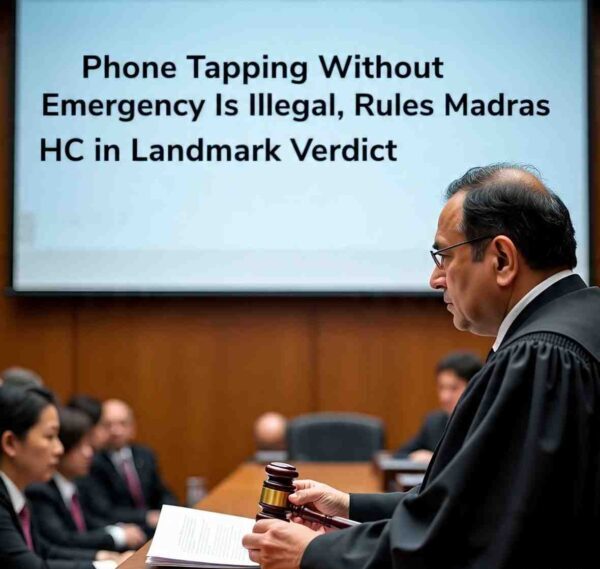The Madras High Court has ruled that unauthorized phone tapping without a declared public emergency violates the fundamental right to privacy under Article 21 of the Indian Constitution. Learn what this landmark judgment means for surveillance laws in India.
Introduction
In a powerful ruling that has drawn national attention, the Madras High Court has declared that phone tapping without a valid public emergency or public safety concern is unconstitutional. The judgment comes as a landmark reaffirmation of the fundamental right to privacy, first underscored in the 2017 Puttaswamy case by the Supreme Court.
With growing concerns around mass surveillance and unchecked executive powers, this decision sends a clear message: Your privacy cannot be eavesdropped on—unless the law strictly demands it.
The Legal Context: What Does the Law Say?
Phone tapping in India is regulated under:
- Section 5(2) of the Indian Telegraph Act, 1885
- Rule 419A of the Indian Telegraph Rules, 1951
These laws allow the government to intercept communication, but only under two strict conditions:
- Existence of a public emergency, or
- Concern for public safety
Even then, interception must be authorized by the Home Secretary and be limited in scope and duration.
But what happens when these rules are ignored or stretched thin? That’s where the Madras High Court stepped in.
The Case: Justice in a Tapped Conversation
The case involved a petition alleging illegal interception of phone calls by law enforcement, without fulfilling the required legal procedures or justifications. The petitioner claimed that their conversations had been tapped without due process, leading to a violation of Article 21 of the Constitution, which guarantees protection of life and personal liberty.
The State defended the interception, claiming it was part of an ongoing investigation. However, they failed to show any documented evidence of a public emergency or a valid authorization from the designated authorities.
The Court’s Analysis: Precision in Constitutional Interpretation
The Madras High Court took a strict constitutional approach, dissecting both statutory provisions and precedent.
Key highlights of the judgment:
- Privacy is a fundamental right under Article 21, as reaffirmed in Justice K.S. Puttaswamy vs. Union of India (2017).
- Surveillance without public emergency or safety justification is arbitrary and fails the test of proportionality.
- The court referred to People’s Union for Civil Liberties (PUCL) vs. Union of India (1997), which had already laid down procedural safeguards to prevent abuse of interception powers.
- It emphasized that citizens are not criminals by default and must not be subject to secret monitoring in a democratic society.
The bench concluded that unlawful tapping amounts to a “direct assault on constitutional freedoms.”
What This Means for You: A Victory for Digital Rights
This ruling has far-reaching implications:
For Citizens:
- Your calls and private conversations are protected by law.
- The government can’t tap your phone arbitrarily without evidence of a serious threat.
For Law Enforcement:
- They must document and justify surveillance activities clearly.
- Every interception request must pass through legal checkpoints, including formal approvals and periodic reviews.
For Courts:
- This sets a powerful precedent that strengthens the guardrails around surveillance.
- It acts as a constitutional compass to navigate future digital privacy disputes.
Why This Ruling Matters More Than Ever
In today’s digital age, where data is currency and surveillance is easy, phone tapping is not just about eavesdropping—it’s about control. With the increasing use of AI, facial recognition, and mass data monitoring, unchecked interception could lead to:
- Political targeting
- Journalistic suppression
- Personal blackmail
- Erosion of dissent and free speech
By drawing a bright red line, the Madras High Court has safeguarded not just privacy but the soul of Indian democracy.
Expert Reactions
Legal scholars and privacy activists have lauded the decision:
“This judgment is a much-needed reassertion that surveillance cannot become the default setting in a democracy.”
— Apar Gupta, Internet Freedom Foundation
“The ruling pushes the state to act transparently. It’s not anti-policing—it’s pro-constitutionalism.”
— Senior Advocate Indira Jaising
Conclusion
This judgment reminds both the government and citizens that liberty doesn’t come with a mute button, and any attempt to monitor private speech must be legally justified, narrowly tailored, and procedurally accountable.
So the next time you hear someone say “your calls are always being monitored,” you can respond:
“Not without a public emergency—and now, the courts have our back.”

























